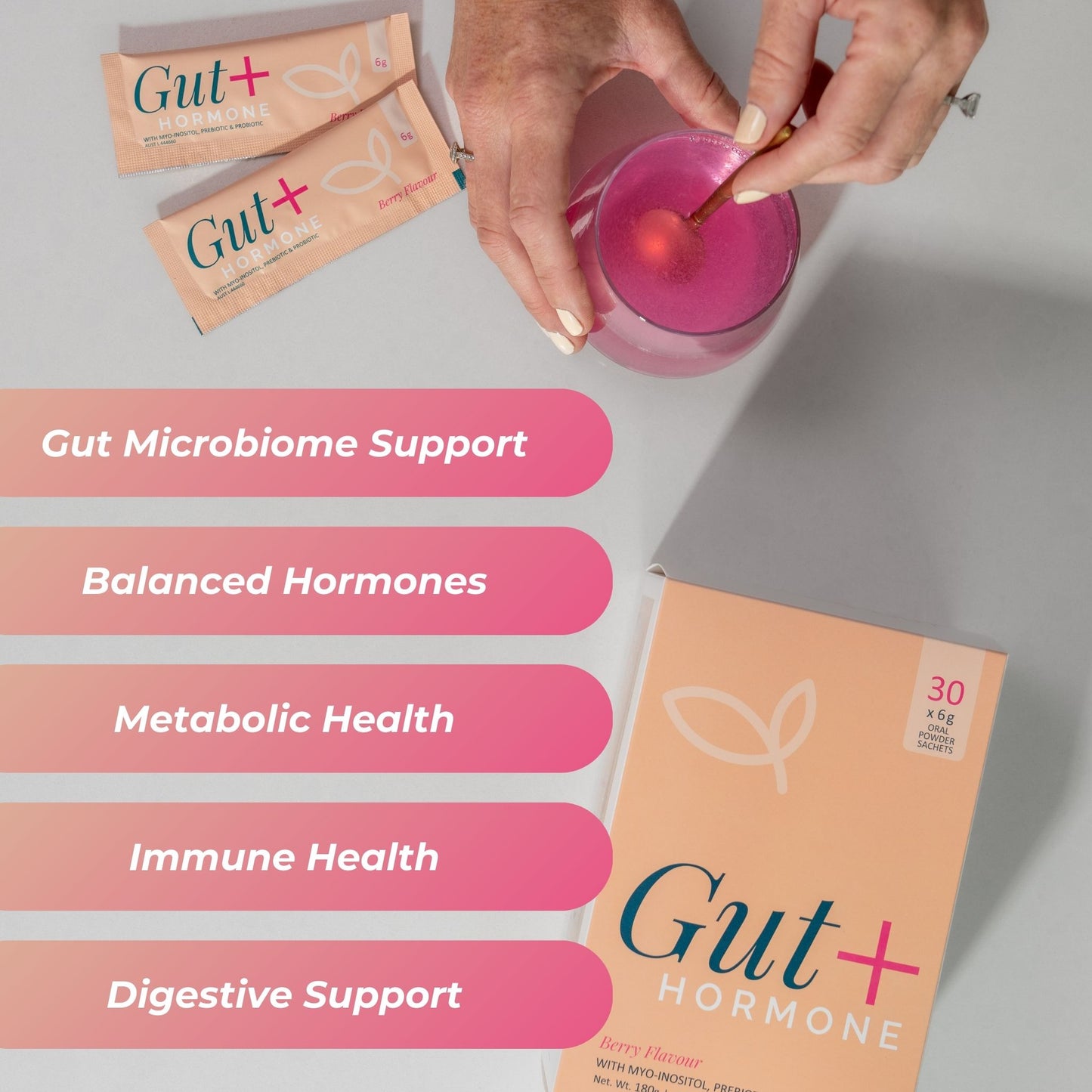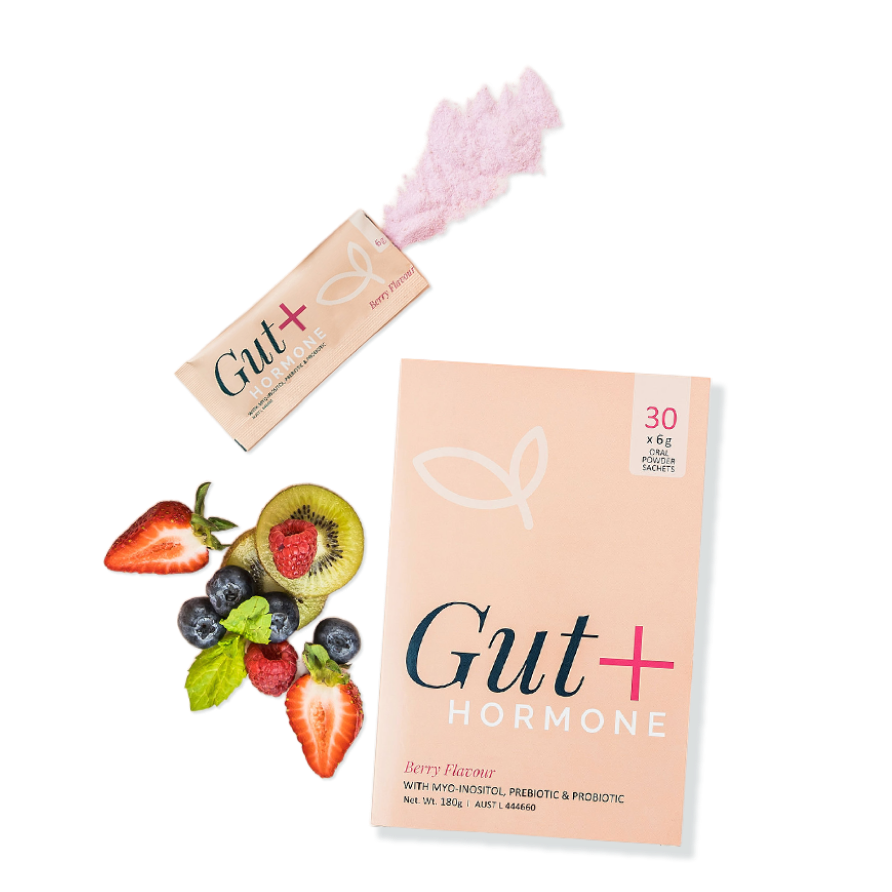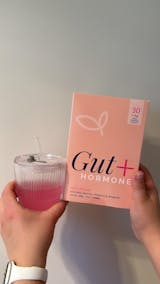Gut + Hormone is uniquely formulated for women with a focus on the gut–hormone connection. While most gut supplements only target digestion, Gut + Hormone contains clinically backed ingredients like myo-inositol, Quatrefolic® methylfolate, Actazin® kiwi extract, vegan D3, and the resilient Bacillus coagulans (Unique IS-2®) to support hormonal balance, gut diversity, immune health, and menstrual cycle regularity. It’s designed to help you feel energised, regular, less bloated, and more in tune with your hormonal rhythm – whether you're menstruating, postpartum, perimenopausal, or simply want to support your gut-hormone axis to feel better.






Rebalances the Gut Microbiome
Actazin® (kiwifruit extract) provides natural prebiotic fibres and enzymes, while the Unique IS-2 probiotic selectively colonises the gut. Together, they enhance microbial diversity, improve bowel regularity, and strengthen the intestinal barrier—laying the foundation for hormonal and metabolic balance.

Stabilises Blood Sugar & Metabolism
Myo-inositol helps maintain insulin sensitivity and healthy glucose control—critical for menstrual health, PCOS management, and reducing metabolic stress during midlife transitions.
Regulates Hormones Across Life Stages
Myo-inositol supports ovarian function and reproductive hormone signalling, while Quatrefolic® (4th-generation folate) optimises methylation and cycle regularity. This synergy supports women through menstruation, perimenopause, and menopause, helping to stabilise hormonal fluctuations.
Strengthens Immune Defence
Plant-based Vitamin D3 and synbiotic compounds modulate gut–immune pathways, enhance antimicrobial peptide release, and reduce inflammation—fortifying both gastrointestinal and systemic immunity.
For every woman, at every stage
Gut + Hormone is designed for women who want to feel balanced, energised, and supported at every stage of life. Whether you’re navigating the rhythm of monthly cycles, managing PMS or PCOS, or moving through perimenopause and menopause, this formula is here for you.
It’s especially for women who...
Experience bloating, irregular bowels, or digestive discomfort that disrupts daily life.
Struggle with PMS, irregular cycles, or hormone-related mood changes.
Want natural, science-backed support for reproductive hormone balance.
Need help maintaining healthy blood sugar levels and metabolic resilience.
Are seeking immune and gut support as they move through different hormonal stages.
Myo-Inositol

Prebiotic Organic Kiwi Fruit Extract (Actazin™)

Methylfolate (Quatrefolic®, the 4th generation of folate)

Unique IS-2 Probiotic (Bacillus coagulans Unique IS-2®)

Vegan Vitamin D3

Most probiotics contain generic strains that may not survive the stomach acid or target female needs. Gut + Hormone uses Bacillus coagulans Unique IS-2®, a spore-based probiotic that survives harsh gut conditions and is shown in clinical trials to reduce bloating, support bowel regularity, and modulate immunity. Plus, you get targeted hormone support – not something standard probiotics offer.
Yes. The formula was crafted to support both. Actazin® kiwi fruit extract gently supports motility and bowel regularity, while Unique IS-2® significantly reduces symptoms of IBS and improves digestion.
Most women notice improvements in bloating, digestion, and sugar cravings within 2–4 weeks, and hormonal changes such as more regular cycles or reduced PMS around 2–3 months of consistent use. Results can vary based on diet, lifestyle, and your starting point.
Yes, but we always recommend speaking with your healthcare provider, especially if you're on medication. Gut + Hormone is safe to use alongside most vitamins, prenatal supplements, and gut health regimes – but combining products with overlapping ingredients like inositol or folate should be done with professional guidance.
Yes. Gut + Hormone includes myo-inositol, which has been clinically shown to improve cycle regularity, reduce androgen symptoms, and support metabolic health in women with PCOS. The gut support also helps reduce inflammation and supports digestive symptoms, which may benefit conditions like endometriosis.
Gut + Hormone is formulated with gut-sensitive women in mind. It’s free from common irritants, gluten, dairy, and fillers. While it is not yet FODMAP certified, many with sensitive digestion tolerate it well due to the gentle nature of spore probiotic and kiwi extract.
Gut + Hormone is TGA listed, Manufactured in a GMP-Certified Facility and undergoes regular third party testing for purity and stability.
Yes – every ingredient is clinically backed in human research studies:Myo-inositol supports ovarian function, insulin sensitivity, weight management and hormone regulation.Quatrefolic® methylfolate is a bioavailable folate that supports cell repair, hormones, and cognitive health.Actazin™ kiwi extract supports motility and gut comfort, protein digestion and the gut microbiome.Unique IS-2® probiotic is clinically proven to survive the gut and improve digestive health, immune function and promote beneficial gut microbes.
















